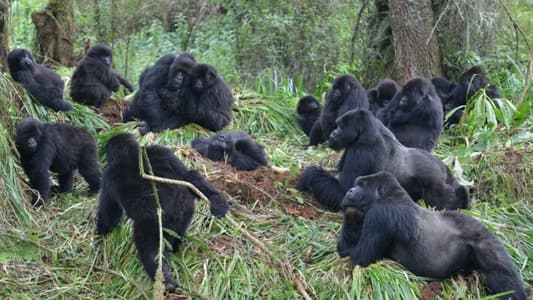When Covid-19 spread rapidly around the world, social distancing became an instant part of our daily routines – but a new study suggests it is not just humans who can avoid coughs and colds by giving others a wide berth.
Researchers working with wild mountain gorillas in Rwanda found that because neighbouring primate groups rarely mixed, illnesses that were easily passed between intimate networks were not spread more widely.
Respiratory infection is one of the biggest threats to ape conservation: they can catch many of the same diseases as humans and in these animals the common cold or flu can be lethal.
Scientists from the Dian Fossey Gorilla Fund studied 15 respiratory outbreaks between 2004 and 2020 to understand how diseases transmitted through a population of mountain gorillas in Rwanda’s Volcanoes National Park.
Close contact and strong social relationships within gorilla groups meant respiratory diseases spread rapidly between group members, they found.
In one outbreak, it took only three days for 45 out of 46 group members to begin coughing.
However, opportunities for infections to spread between neighbouring groups were limited, according to the study.
Yvonne Mushimiyimana, a co-author on the project, said: “The outbreaks we investigated all appeared to stay within a single group rather than spreading through the wider population.
“Gorilla groups interact fairly infrequently, and when they do they tend to keep their distance, rarely approaching to within that crucial one to two-metre distance.“
The gorilla’s aloofness toward neighbouring groups helped protect the wider population by limiting broader transmission of these infections.
So if gorilla groups were not infecting each other, where did these outbreaks come from? “Our best guess is that these infections in mountain gorillas are coming from humans,” said Dr Robin Morrison, lead author on the study.
“It really highlights the importance of ongoing efforts to minimize wild great ape exposure to human diseases during activities like research, tourism and protection.
“Vaccination, mask wearing and maintaining adequate distance are all more important than ever in the midst of a global pandemic.”
Dr Tara Stoinski, president and chief scientific officer of the Fossey Fund, said: ”The findings from this study suggest that since respiratory diseases transmit quickly within gorilla groups and transmission between groups is much less common, strategies that prevent initial transmission into a group may be most effective.
“For Covid-19 and other human respiratory pathogens, that means preventing that first introduction of a disease from a human to a gorilla.”






TWEET YOUR COMMENT